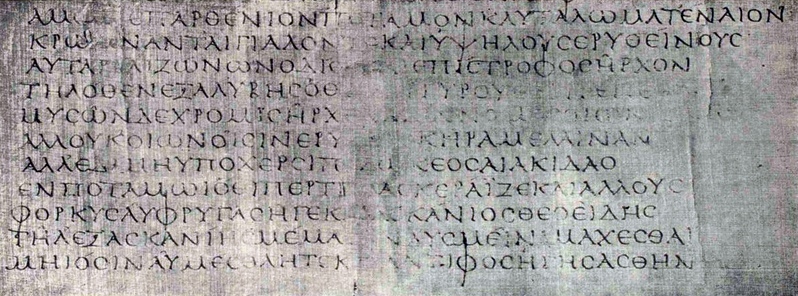Next in line will be a post about Kharassukhumi writing, and while it’s being prepared, I’ll write about something for which I don’t need additional materials - just my head.
Archaic modern languages.
I think each of you has heard the phrase “ancient language” at least once in your life. Our natives call Retsinsky and Rechansky ancient and argue which one is more ancient; Skadinsky, ancient Hellenic and a few more - in general, they are certainly ancient. Is it true?
No!
Let's start with the fact that all languages are equally ancient. For example, because they all appeared during the Khivris pandemonium. Or, in other words, because they have been continuously evolving since the very dawn of the emergence of intelligent species. I can give a few more examples, but I think it’s clear.
Much more correct from the point of view of common sense would be the phrase “archaic language” - that is, one that has changed very little over a long period of time and has retained many of the features that were inherent in it even then, a long time ago. So, just for general erudition, I’ll go through them now. For now, according to those that are in use in Orov.
1. Zhutovsky wins by a wide margin! Others can argue with him as they please, but the fact remains: over the past two and a half thousand years, he has hardly changed. Perhaps the vocabulary has been updated, but this is quite natural. Now, for example, I will show one phrase from a song, first in its modern form, and then - how it would have looked somewhere at the beginning of our era. Provided that all the words are the same, of course.
kaip obelis, apsunkusi nuo vaisių, užlaužiu tragiškai nusvirusias rankas
kaip ābelis, apsunku(n)sī nō waisjun, užlaužjū tragiškai nuswiru(n)sja(n)s ranka(n)s
as you can see, except for the word tragiškai (“tragically”), which then in principle could not exist, the rest looks as similar as possible. The name of the song is Laisvė (“Freedom”), I think I already threw it here once.
2. Geartoy. Starting somewhere from the seventh century, it remains practically unchanged, but in the interval between the fifth and sixth centuries its system of times was VERY reworked. In addition to the three already existing numbers (singular, plural and dual), a spider (“several”) was added there, and the species-time system almost doubled in size (all sorts of perfects in the future and other terrible things). In phonetics, several minimal changes occurred, of which the most characteristic is: diphthongs āy and ay (a:y and ah) merged into one diphthong oh (Ouch). That is, if earlier their language was called jeārţāy, then now he is known to everyone under the name jeārţoy. So it goes.
3. Kharassukhumi. I understand it, alas, disgustingly, but the changes, as far as I can judge, are quite ordinary. Morphologically, everything remained the same plus or minus (if we count from the beginning of our era), the word order became much more strict, and the vowels also moved in all possible and impossible directions. This happened due to the influence of consonants (both the previous and the following), and... the fact is that in Kharassukhumi it is the set of vowels of a word that expresses its morphological meaning. Previously, this system was very transparent, but now look for yourself:
was: yadqañr, "he dwells"
became: edqañr
was: yaqrañb, "he is dying"
became: yaqrañb
was: yawẓañr "He is known"
became: ... oẓeñr
I won’t continue further, it’s bad there.
And finally. Ask why I didn’t say about the Alvian languages? Because they are cheaters, they live a long time and they preserve their literary standards very carefully, so it is generally useless to look there. Thousands of years have passed and nothing has changed.
That's all. Stay tuned for updates and don't get too bored!

